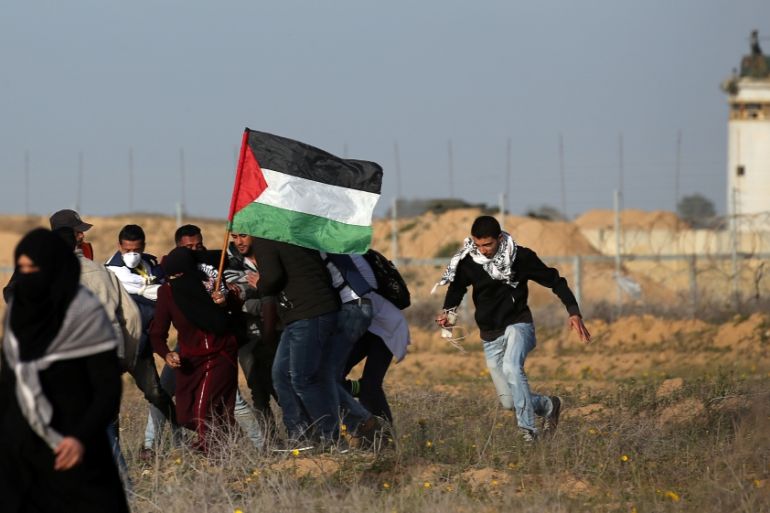Israel begins construction of new Gaza barrier
Six-metre tall fence will prevent Palestinians from infiltrating Israel from the Gaza Strip, prime minister says.

Israel has said the work to strengthen its fence along the Gaza Strip entered a new phase with construction starting on a massive new barrier along the frontier.
“Over the weekend we began building the above-ground barrier along the Gaza border,” Prime Minister Benjamin Netanyahu told journalists on Sunday before a weekly cabinet meeting.
Keep reading
list of 4 itemsIn the jungle with Myanmar’s rebels as thousands of new recruits join
‘Old friend’ Putin and China’s Xi strengthen strategic ties at summit
Russia-Ukraine war: List of key events, day 812
The barrier, set to stand six metres off the ground, will be constructed on the pretext of preventing the infiltration of Palestinians from the Gaza Strip into Israel, Netanyahu said.
The Israeli prime minister gave no further details but a defence ministry statement said the work on the structure began on Thursday.
It is set to follow the 65km course of an underground barrier also under construction meant to neutralise the threat of cross-border tunnels built by fighters from Gaza.
At its western end, the statement said, the above-ground barrier would join a fortified sea wall jutting into the Mediterranean aimed at blocking Palestinian attacks by water.
|
|
The construction of the wall is expected to finish by the end of the year.
“It’s massive and especially strong,” the ministry said in an accompanying video clip.
Local Palestinian news agency Maan reported on Sunday that Israeli forces arrested five Palestinians who crossed the Israeli fence in the southern Gaza Strip.
While Israel admitted to arresting the Palestinians and taking them to an unknown area, no further information was provided.
In the last Gaza war in 2014, Israeli forces killed four Hamas fighters who managed to cross into Israel by the sea.
Last November, an Israeli special forces team infiltrated an area near the southern city of Khan Younis in a civilian vehicle, leading to a shoot-out that resulted in the deaths of seven Palestinian and one Israeli soldier.
The undercover Israeli unit managed to leave the strip under the cover of Israeli air raids.
Military action?
Israel established a concrete wall to separate the occupied West Bank from Jerusalem two years after the second Intifada began in 2000. It has also built walls along the border with Egypt, Jordan, Lebanon and the occupied Golan Heights.
Some Israeli commentators have said Netanyahu would be unwilling to see a new uptick in hostilities with Gaza’s Hamas rulers in the run-up to Israel’s general elections set for April 9.
But the prime minister, who is also the defence minister, on Sunday pledged the upcoming polls would not affect security decisions.
“If the quiet is not maintained in Gaza, we will make the decisions even in the elections period and will not hesitate to act,” he said.
Palestinians have for nearly a year gathered at least weekly along the Gaza border for protests.
They want to be able to return to the villages and towns their families were ethnically cleansed from in the follow up to Israel’s establishment in 1948. The protesters have also been calling for an end to Israel’s 12-year blockade of Gaza.
At least 246 Palestinians have been killed by Israeli fire in Gaza since March 30, the majority during protests but also by tank fire and air attacks.
Two Israeli soldiers have been killed over the same period.
Israel says its actions are necessary to stop mass incursions into its territory.
It accuses Hamas, against whom it has waged three wars since 2008, of seeking to use the protests as cover to carry out violence. Hamas has rejected these claims and said while it supports the weekly demonstrations, they remain organised by civil rights organisations.